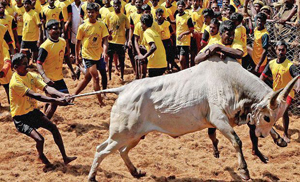New Delhi, Dec 28: The Centre is set to allow popular bull taming sport Jallikattu and a few other bullock races in the new year with Environment Minister Prakash Javadekar today saying that the government will let such cultural practices continue while ensuring that animals are not subjected to cruelty.
"Jallikattu in Tamil Nadu, bullock cart race in Maharashtra, Kambala in Karnataka and some sort of race using bullocks in Punjab has been traditionally and culturally practiced for centuries. We want to respect that but also ensure that there should be no cruelty.
"Therefore, we will give you good news in the next couple of days. We will give you good news so that the cultural practice can be followed as well as cruelty should not happen to animals. We have found out some ways and will announce by January 1. The government is positive on the issue," Javadekar told reporters.
These events involving animals will be permitted to continue "for sometime," he said responding to a question about these sports.
Sources, however, said that the government is likely to issue an executive order in this regard on January 1 and Environment ministry had consulted with Attorney General Mukul Rohatgi on the issue.
Jallikattu also known Eruthazhuvuthal is a bull taming sport played in Tamil Nadu as a part of Pongal celebrations on Mattu Pongal day.
The Supreme Court had banned using bulls for Jallikattu events or bullock-cart races across the country and directed governments and Animal Welfare Board of India to take steps to prevent the infliction of unnecessary pain or suffering on animals.
The ban on Jallikattu has dampened Pongal festivities in the state, especially in southern districts where it has been a popular event for centuries, and there has been demands for facilitating its conduct.
Javadekar had earlier hinted that the Centre would consider taking steps, including amending laws to allow the sport.





Comments
Add new comment